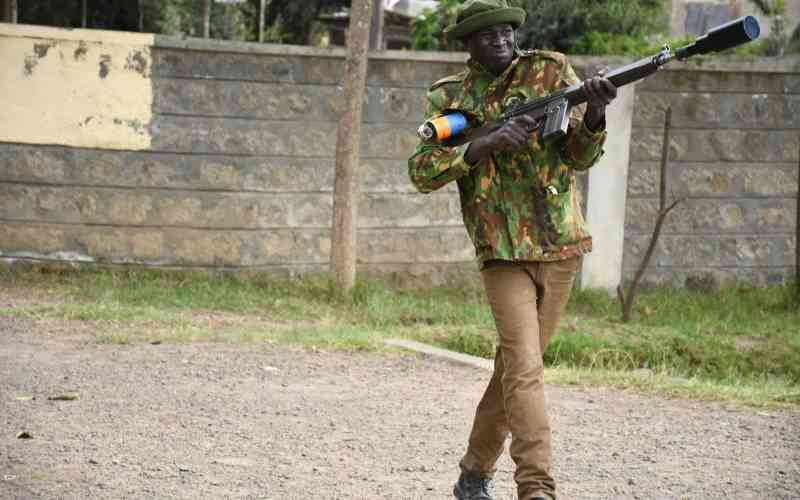
As 2024 comes to a close, it will go down in history as a year worth remembering for both joyful and mournful reasons. On the one hand, the endless cases of femicide and police brutality, as well as the ongoing abductions, left a bad taste in the mouth of many. In spite of this, Kenyans, and especially the youth, showed their resilience and patriotism by fighting for their country and against bad governance, and it looks as though the struggle will continue well into the new year.
But amidst this revolutionary moment, a disquiet buzzes in the background. Online, the movement to resist poor governance is led by all, but none are more loud and prominent than the voices that, prior to the protests, gained notoriety through peddling the ideas of what is known colloquially as the manosphere. In a nutshell, the manosphere is a movement that espouses purportedly masculine ideals, seeking to return to an era where men ruled over women and children without question. This movement holds under its umbrella several groups of men, from those who are woefully alone (incels), to those who choose solitude (men going their own way), and those obsessed with bedding as many women as possible (pick up artists), to name a few subsets. In spite of their differences in ideology, one uniting factor in the manosphere is rampant misogyny. As a consequence, the unfortunate marriage between the manosphere and liberation movements online has bred an online campaign that espouses misogyny and sexism at its most technologically advanced peaks.
At the start of the movement for liberation, low level sexism was witnessed in how certain politicians viewed as being sympathetic to the government were addressed. Kimani Ichung'wah, for instance, upon being discovered as having been the one that tabled so many of the controversial Bills that were before Parliament in 2024, was portrayed online as President Ruto's girlfriend. AI images of him in makeup and a wig were generated to drive the joke home. The fact that he is Majority Leader of the National Assembly was not taken into account; the conclusion for many online was to sexualise and feminise his motives.
For the women, Karen Nyamu was subjected to insults that bordered on whorephobia for expressing her thoughts on the taxation of sanitary pads. And on a grander scale, discussions about how to move forward in fixing the nation would often list as their first objective the abolition of the Woman Representative position from the National Assembly, for the sole reason that many did not see why these women were needed in Parliament.
The bigotry did not limit itself to misogyny. For many in the manosphere, maintaining a slender frame is a key goal in order to attain peak masculinity. As such, any comments made by David Ndii online were met with fatphobic retorts, with the insinuation being that, ever since Ndii joined government, he had gained weight and lost his ability to think, the former being the reason for the latter.
As misogyny does not limit itself in scope, soon prominent youth within the movement began to receive the same treatment. Even as the key male conversation shapers in the movement fell by the wayside, having been somehow influenced to toe the government line, it is the women in the movement who received most backlash despite remaining steadfast. Hanifa Adan is perhaps the best example of this, having dedicated herself to ensuring that those injured or killed during the protests were attended to, yet receiving sexist and Islamophobic comments daily online.
Can a revolutionary movement be successful when it is so encumbered with bigotry? Feminist thinker bell hooks argued that it cannot, stating that "Sexism has diminished the power of all black liberation struggles - reformist or revolutionary". The segmentation of different facets of society, and the prioritisation of the freedoms of certain categories of person as against those of others, will likely be Achilles heel of the movement if changes are not made soon. So often, women participating in the discourse online are shut down when they ask that their problems be taken as seriously as those of the collective. The femicide protests were a key example of this, with some men feeling that a discussion on the existence of femicide was in itself a distraction from the larger movement, not realising that, to paraphrase Audre Lorde, none of us can be free until all of us are free.
Toni Cade Bambara provides a roadmap for moving forward if the movement is to make some positive gains in the coming months and years. She suggests that "Perhaps we need to let go of all notions of manhood and femininity and concentrate on Blackhood," and while, on the face of it the suggestion may appear counterproductive, it does make some strategic sense. If the movement were to prioritise personhood and humanity, it would leave nobody behind and would take into account everybody's grievances. Nobody would be deemed less worthy of audience for being a woman or fat or even effeminate. We need to reshape the conversations we are having, even before strategising on the way forward for this country, so as to ensure that everyone is taken care of. Perhaps the new year will blow the winds of change in this direction.
 The Standard Group Plc is a multi-media organization with investments in media
platforms spanning newspaper print
operations, television, radio broadcasting, digital and online services. The
Standard Group is recognized as a
leading multi-media house in Kenya with a key influence in matters of national and
international interest.
The Standard Group Plc is a multi-media organization with investments in media
platforms spanning newspaper print
operations, television, radio broadcasting, digital and online services. The
Standard Group is recognized as a
leading multi-media house in Kenya with a key influence in matters of national and
international interest.
